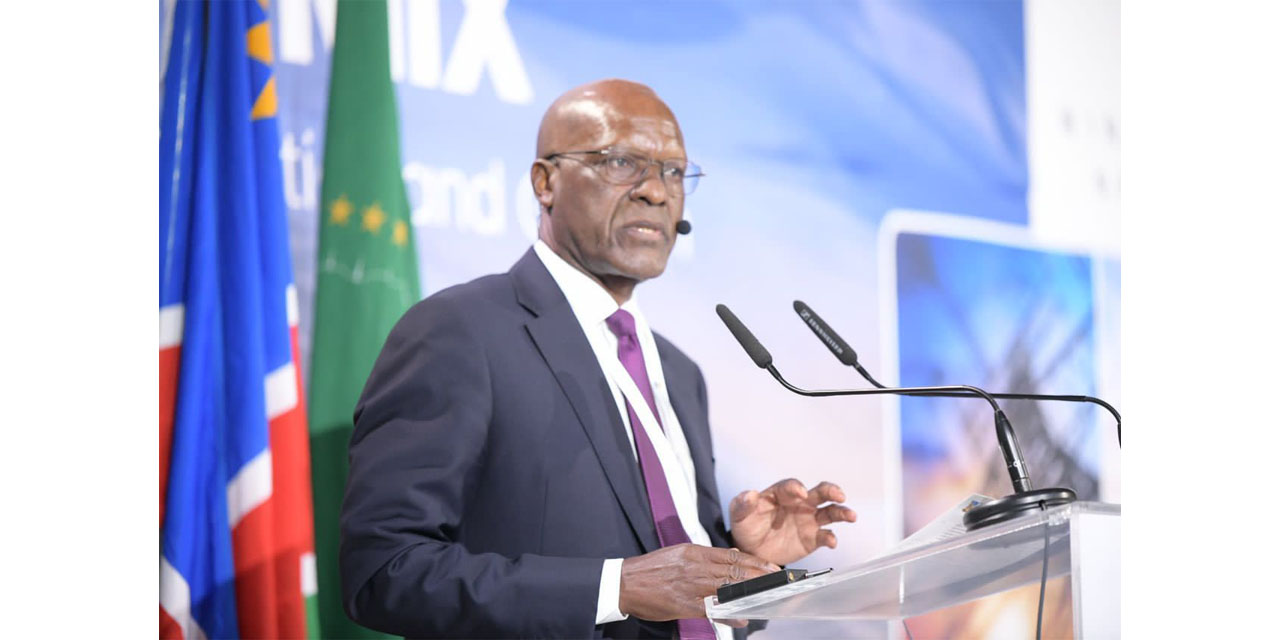Tujoromajo Kasuto
Minister of Mines and Energy, Tom Alweendo says for Africa’s energy poverty to become history, there is a need to think differently about the countries capability and what needs to be done to attract the necessary investment in the energy space.
Alweendo was speaking at the ongoing Namibia Energy Investment Conference in Windhoek today.
He says some estimates suggest that the continent needs an annual investment of US$20 billion from now until 2030, which he believes is impossible, ‘’but there is a need to think and act anew’’.
Additionally, he highlights that significant developments have emerged within the renewable energy sector be it solar, wind, hydro and green hydrogen.
Here in Namibia, “we have taken a conscious decision to make the country a global hub for green hydrogen. Our vast solar and wind resources provide us with a strong foundation for the development of green hydrogen hub on the continent. We also see domestic renewable energy generation and green hydrogen production as key vectors of national decarbonisation,” he says.
Alweendo notes that the two offshore oil discoveries that were made not so long ago increased Namibia’s potential to become an oil producing country, which is a great economic opportunity.
After the discovery there are now questions on why government is embracing both renewable energy and fossil fuels.
“Our position is that it does not make sense for us to suffocate ourselves by cutting off potential hydrocarbon resources that could assist in solving our socio-economic problems. It is more sensible to take a pragmatic approach in the energy transition conversation. Our concerns are more with providing livelihoods and supplying basic necessities to the country’s growing population. “
Furthermore, he notes, that Africa is only responsible for 3% of the global carbon dioxide emission. “We suffer from energy poverty and this is despite the natural abundance of fossil fuels and renewable energy resources.”
He says that governments position is on energy transition that it has to be just, especially when taking into regard the sources of energy available like hydrogen carbons, fossil fuels, that can be leveraged to industrialise the economy and provide livelihoods from those resources, thus government’s argument is that they should be allowed to do that.
Alweendo emphasizes that the African continent does not have access to energy and where it does it is insufficient for its needs.
“We have an energy crisis that is spilling its havoc on economic, social and political issues. We therefore need to start asking ourselves some difficult but necessary questions on how best to navigate the rocky shores of reality and arrive safe on the other side. How do we navigate the geopolitics of energy? How do we go about navigating around the energy environmental issues?,“ he inquires.
Africa’s energy gap is huge, which the minister points out, is due to infrastructure deficits, insufficient critical investment in the energy sector and at times unhelpful regulatory frameworks that do not encourage investment in the energy sector as over 600 million of Africans do not have access to electricity.
“It is therefore important for us on the continent to start making radical but informed measures on how to tackle the energy deficit. It is time that we become the main drivers of Africa’s future. If we are going to make Africa’s energy poverty a history, we need to start reimaging ourselves. We need to start to think differently about our capability. We need to start to think hard as to what needs to be,” he states.




